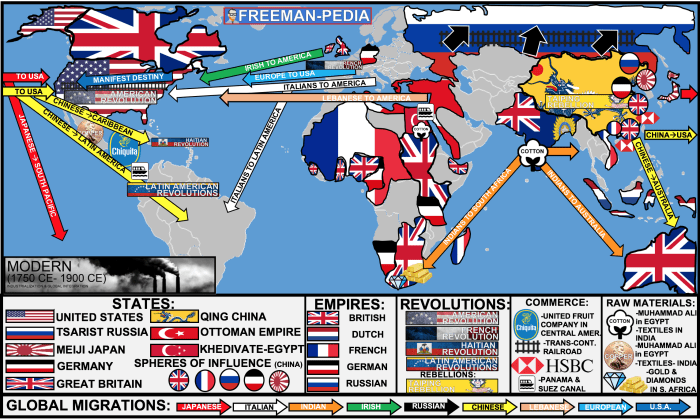Unit 6: Imperialism from 1750 to 1900 embarks on a comprehensive exploration of imperialism’s profound impact on the global landscape. From its inception to its enduring legacies, this unit unveils the multifaceted nature of imperialism, its motivations, consequences, and the resistance it encountered.
The narrative delves into the rise of European powers as imperialists, examining the economic, political, and social factors that fueled their expansion. It sheds light on the Scramble for Africa, analyzing its causes, consequences, and the impact on African societies.
The discussion extends to imperialism in Asia, comparing and contrasting the experiences of different Asian countries under colonial rule.
Imperialism: An Overview
Imperialism is the practice of extending power and influence by a country over other territories, usually with the intention of exploiting their resources or controlling their people. It has been a major force in world history, shaping the political, economic, and cultural landscapes of many regions.
Imperialism can take various forms, including direct rule, indirect rule, economic domination, and cultural hegemony. The motivations for imperialism are complex and often intertwined, but they typically include economic gain, political power, and cultural superiority.
Throughout history, numerous empires have emerged, including the British Empire, the French Empire, the Spanish Empire, and the Roman Empire. These empires have controlled vast territories and exerted significant influence on the development of world history.
The European Powers and Imperialism
The rise of European powers as imperialists began in the 15th century with the Age of Exploration. Economic factors, such as the search for new trade routes and markets, played a major role in driving European imperialism. Political factors, such as the desire for power and prestige, also contributed to the expansionist ambitions of European nations.
European imperialism had a profound impact on the colonized regions. It led to the exploitation of resources, the displacement of indigenous populations, and the imposition of European political and economic systems.
The Scramble for Africa
The Scramble for Africa was a period of intense colonization of Africa by European powers that took place between 1881 and 1914. The causes of the Scramble for Africa included the desire for economic resources, the need for new markets, and the political competition among European nations.
The Scramble for Africa had a devastating impact on African societies. It led to the loss of land, the disruption of traditional economies, and the displacement of populations. It also contributed to the rise of ethnic and political conflicts in Africa.
Imperialism in Asia
European imperialism in Asia took various forms, including direct rule, indirect rule, and economic domination. The impact of European imperialism on Asian societies was complex and varied. In some cases, it led to economic development and modernization. In other cases, it led to the exploitation of resources, the suppression of local cultures, and the disruption of traditional political and economic systems.
The United States and Imperialism: Unit 6: Imperialism From 1750 To 1900

The United States emerged as an imperial power in the late 19th century. The motivations for American imperialism included economic expansion, the desire for political power, and the belief in the superiority of American culture and values.
American imperialism had a significant impact on the Philippines, which was a US colony from 1898 to 1946. The US also acquired other territories, such as Puerto Rico, Guam, and Hawaii, during this period.
Anti-Imperialist Movements
Anti-imperialist movements emerged in many colonized regions in the late 19th and early 20th centuries. These movements sought to resist foreign domination and achieve independence. Some anti-imperialist movements were successful, while others were suppressed by colonial powers.
The Indian independence movement, led by Mahatma Gandhi, is an example of a successful anti-imperialist movement. Gandhi’s philosophy of nonviolent resistance inspired other anti-colonial movements around the world.
The Legacy of Imperialism
The legacy of imperialism is complex and multifaceted. It includes both positive and negative aspects. On the one hand, imperialism led to economic development, technological advancements, and the spread of Western culture and ideas in some regions.
On the other hand, imperialism also led to the exploitation of resources, the disruption of traditional societies, and the loss of cultural diversity. The legacy of imperialism continues to be debated and contested today.
Q&A
What were the primary motivations for European imperialism?
Economic gain, political power, and the desire for new markets and resources.
How did the Scramble for Africa impact African societies?
It led to the partition of Africa, the imposition of colonial rule, and the disruption of traditional African political and social structures.
What were some of the key forms of anti-imperialist resistance?
Armed uprisings, boycotts, civil disobedience, and the formation of nationalist movements.

